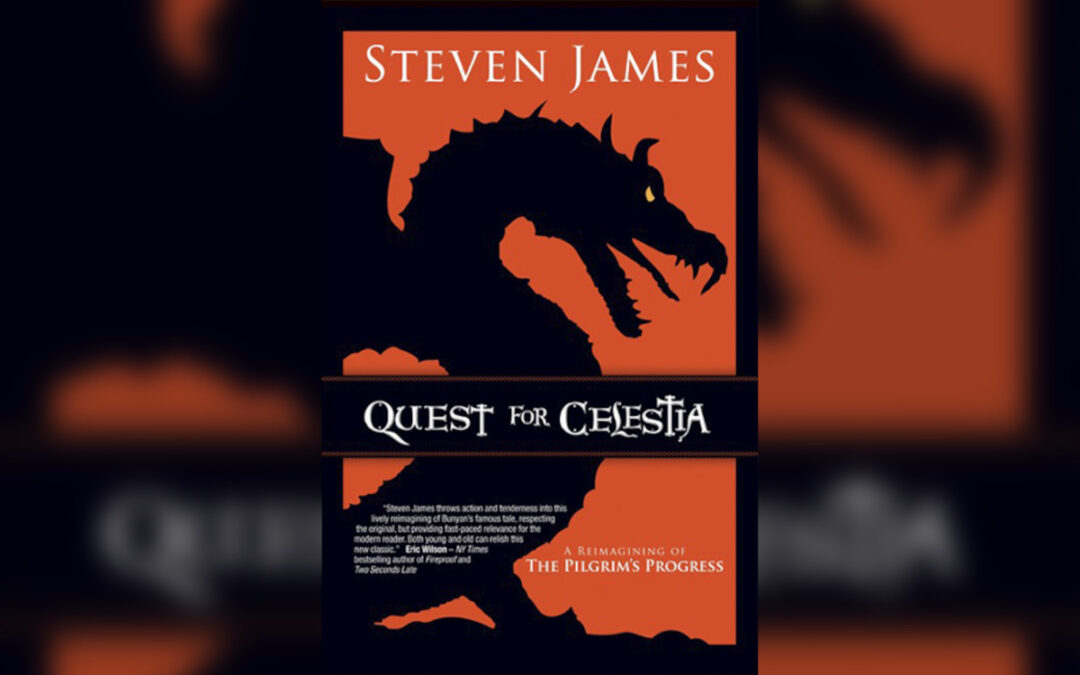I snagged an ebook of Quest for Celestia several years ago. Steven James is a great writer, but despite this, I never managed to read it. I much prefer audiobooks, as they allow me to multi-task. So, when I heard that they’d released an audio version, I jumped on it.
Summary
Quest for Celestia is a retelling of Pilgrim’s Progress, told not from the perspective of a theologian like Bunyan, but from the pen of a storyteller.
I enjoy seeing people like you live. —Alcion
After reading a book that bleeds real blood, Kadin discovers that a disease infects not only himself, but everyone in his village. Rejected by the town, he embarks on an adventure to find the fabled city of Celestia.
On the way, he befriends allies and defies enemies. He must flee arrows and face a dragon. Most of all, he must choose the right path, and there are many wrong ones.
Impressions
The story is fun and exciting. Adventure follows Kadin wherever he goes, and he’s rarely sure who to trust or what choices to make.
It slows down from time to time when some allegorical dreams and conversations play out—a hazard of allegories. But many people will still enjoy these spots. Readers with an interest in spiritual things should find these moments intriguing. For others, the strength of the characters will be enough to keep them engaged. However, some may find these areas too slow and want to skip ahead.
Kadin meets a young lady traveling the Celestia as well. They begrudgingly travel together and a (very) slow-burn romance ensues. The growth of their relationship is a delight to read.
It’s been many years since I read The New Pilgrim’s Progress (itself an updated version from the original), so my memory of it is hazy. But from what I remember of it, Quest for Celestia follows it reasonably well.
Themes
Truth is not a tamed beast to bridle as you please,
Truth is wild and runs and pants and leaps and climbs and breathes.
As you might expect from an allegory, Quest for Celestia has strong themes. Here are a few:
- Discerning truth and lies
- Forgiveness and redemption
- Loving friends and enemies
- Fighting evil and serving God
Ultimately though, Quest for Celestia is about the Christian life. The goals, hazards, losses, and victories Christians experience. Concerns every believer in Jesus faces to one degree or another.
Reflections
In most fiction, the story is just a story. Meaning may be found below the surface, but it manifests in basic themes, not in another story.
In allegory, the story is actually two stories. There’s the surface-level story and then a whole other deeper story underneath told through the symbolism.
Allegories are hard. How do you combine the two stories into one? When the two align, great. But what do you do when they diverge? Ideally, you’ll find a way to make them mesh. But if you can’t? Do you compromise on one for the sake of the other? If so, which one?
Such compromises inevitably hurt. The surface story might suffer from plot holes or dull spots or a rocky flow of events. Alternatively, the symbolic story might diverge from the author’s vision and communicate a different message than intended.
I believe James pulls off this balancing act well. The surface-level story is entertaining and fits together with no plot holes that I could see. The adventure takes a hiatus in a couple of places as symbolism and themes are explored through dreams and conversation, as I said. But these diversions are not long and have a charm of their own.
The allegorical tale of the Christian life rang true to me. Discerning truth, following God despite opposition, brothers and sisters in Christ aiding one another while not always getting along—even the continuous nearness of God in our lives whether we feel Him or not. Over and over, the allegory feels accurate.
Will You Like It?
This book is for you if you:
- Like fantasy
- Enjoy exploring symbolism (I’m talking to you, book clubs! You too, English teachers!)
- Are interested in Christianity
If that sounds good to you, check out Quest for Celestia →
